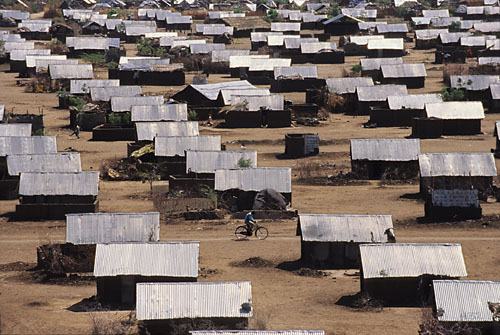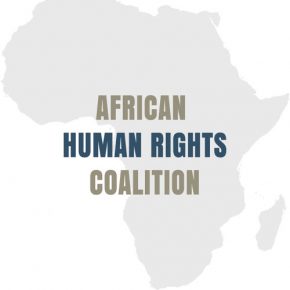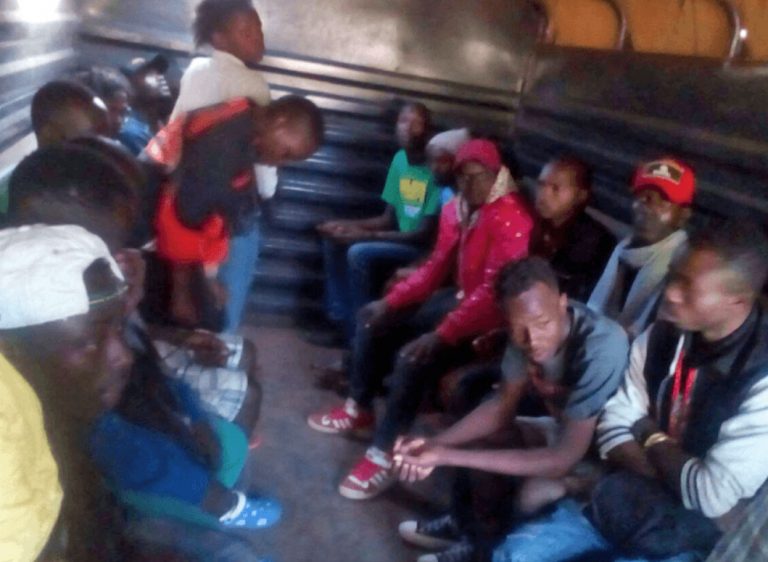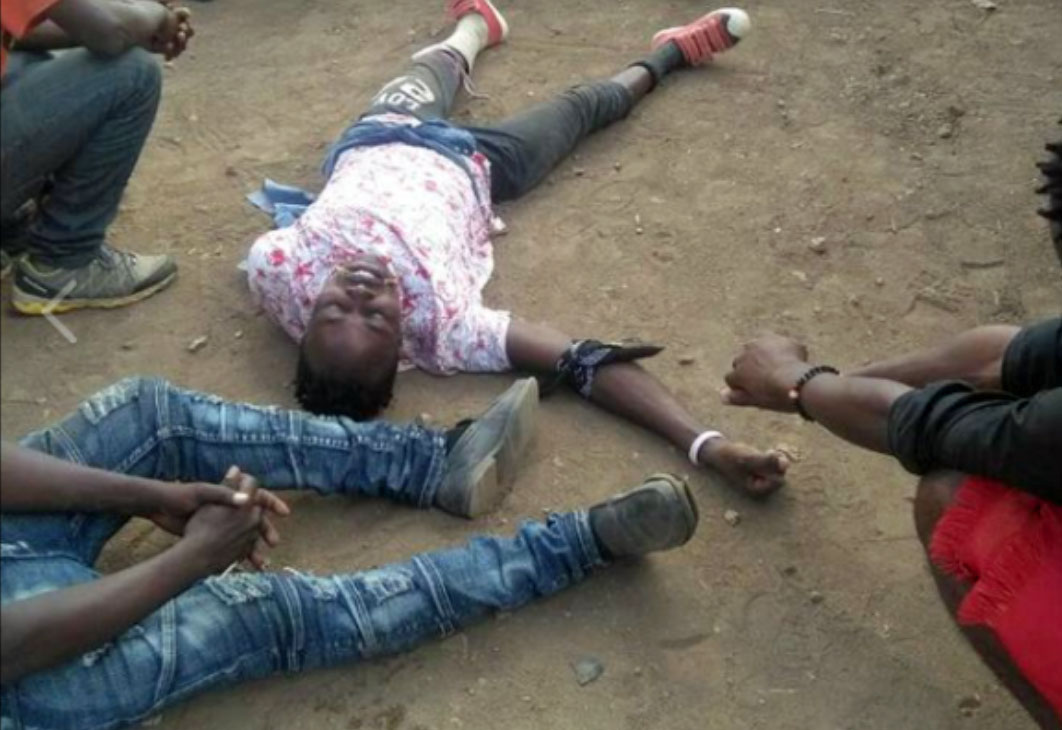Kenya: LGBTQ refugees face cutbacks; how to respond
Colin Stewart is a 45-year journalism veteran living in Southern…
Organizations that assist LGBTQ refugees in Kenya are preparing to stop paying financial support for refugees in Kenyan cities, a decision that has the potential to spark protests, violence and disruption of the already-slow refugee-resettlement process.

The U.S.-based African Human Rights Coalition (AHRC) is counseling refugees and their supporters about how to respond to the cutbacks, which have long been predicted by the HIAS refugee organization and the U.N. High Commissioner for Refugees (UNHCR).
Advice for refugees: The AHRC is urging refugees to cooperate with individual HIAS reassessment interviews and to refrain from premature protests that could harm individuals’ prospects for resettlement or even provoke backlash against the entire LGBTQ refugee community by homophobic Kenyan officials.
Advice for donors: The AHRC is urging donors to be wary of giving money to fund protests and instead to consider donating to programs that allow refugees to earn an income. The AHRC and its partners are currently developing such programs. This blog will publish information about those and similar programs as the information become available.
The planned cutbacks on stipends come more than a year after a large group of refugees from Kakuma were relocated to Kenya’s capital, Nairobi, in December 2018. At the time, in an exception from usual procedures, the group was given monthly financial assistance, regardless of their individual situations. They were also told that the stipends were temporary and that they should explore avenues to support themselves in conjunction with the UNHCR and partners.
Hundreds of LGBTQ refugees from homophobic East African nations are currently in Kenya’s Kakuma Camp, with many more in Nairobi as part of an overall refugee and asylum-seeker population of almost 500,000, many thousands of whom are vulnerable for a range of reasons related to their specific profiles.
Resource constraints, as well as issues of equity, dictate that cash assistance be tightly targeted to the most vulnerable refugees and asylum seekers.
LGBTQ refugees have been targets of anti-LGBTQ discrimination and occasional violence in each Kenyan location, including assaults on refugees protesting the injustice of how they are treated and the inadequacy of stipends of $60 a month or less that some refugees receive.
A unknown number of the refugees have been resettled in host countries in Europe and North America.
This is the AHRC advisory about stipends and protests:

Many refugees in Kenya have contacted AHRC expressing concern that HIAS is cutting off stipends. We are clarifying the following, and issuing this advisory, based on what we know, which we hope may be helpful to refugees in Kenya at this time. This is the first of 2 advisories. The second, FEB ADVISORY TWO, will outline the choices and process for refugees who are stuck without stipends and will be issued within the following week.
I. ADVISORY SUMMARY:
To Refugees:
A] Fully cooperate with HIAS reassessment interviews
B] Consider and consult about your INDIVIDUAL options, during and after you have had your assessment
To donors:
D] PLEASE be fully informed of the consequences and possible outcomes to ALL refugees before donating money for protest T-shirts and banners, especially when there are refugees currently in need of food, and when money can be well spent on livelihood programs.
II. EXPLANATION:

Why is this happening:
a) Specific circumstances
Assessments: Those who were transferred were given assistance without assessments, and many covered by HIAS stipends are now for the first time being assessed or re-evaluated.
Encampment: Kenya has an encampment policy: This is strict Kenyan law requiring that all refugees are supposed to be in Camps. In camps, such as Kakuma, UNHCR is able to facilitate shelter and food rations. This cannot be provided in general in urban areas.
Warning: word has it that Kenya is intending to clamp down on any unpermitted/ undocumented foreigner / refugee who is not in a camp. This could result in arrests, possible deportations, risk to resettlement and could risk refugee programs. For LGBTQI people arrests are particularly dangerous as homosexuality is still a criminal offense in Kenya. There is NOTHING UNHCR can do to change Kenyan law or policy.

The Kenyan Government is a hostile host to LGBTQI refugees, because they are considered criminal under Kenyan law. Homosexuality is subject to the punitive penal code in Kenya and as recently as last year, the Courts upheld the criminal code, refusing to rule it unconstitutional.
Protests: It is correct and true that under the Kenyan Constitution people are legally able to protest. However any LGBTQI refugee who chooses to protest, even if there is lawful police protective permit to do so, is under great risk of arrest, especially if not documented to be in Nairobi. If there is the slightest amount of provocation or the mere perception of provocation, such can trigger violence, similar to what happened in the past, also placing the entire program for ALL LGBTQI at risk of being terminated by Kenya.
Kenya could end the refugee program for all LGBTQI refugees at any time. This means all LGBTQI people are at risk if the Kenyan government is provoked. It is clear that Kenya will not change the encampment law. It is clear UNHCR and HIAS have limited funds and it is clear that refugees will be reassessed and that stipends will not go on without being checked.
HENCE, in conclusion, we urge refugees and donors who are considering any form of protest to reconsider such under these exceptional and dangerous circumstances, and to first obtain individual assessments, then seek consultation for personal durable solutions and/or seek further solutions/ recourse under FEB AHRC ADVISORY TWO, to be released in several days.
b) General circumstances
There are over 60 million migrants globally and the refugee system is exhausted and over-taxed. UNHCR does not have the capacity to fully support all refugees. Resettlement is not guaranteed. Refugees are best able to sustain themselves when they are able to succeed at livelihood programs, whether in urban areas or camps. Therefore donors are encouraged to seek out such programs rather than to enable the current uncertainty, which in truth is fraught with complexity and subject to corruption.
Accordingly, we urge all People of Concern (POC), refugees, organizations, donors, CBO’s to work in collaboration and unity with each other, for the best interests of all. Hence anyone considering any form of support is welcome to check in with African HRC, to ensure that their experience is unifying and not divisive.
III. We conclude by repeating this advisory:
A] Fully cooperate with HIAS reassessment interviews;
B] Consider and consult about your INDIVIDUAL options, during and after you have had your assessment;
C] Refrain from premature protests that may result in actions that hurt you, your chances of resettlement and threaten the entire refugee program in Kenya
D] DONORS PLEASE be fully informed of the consequences and possible outcomes to ALL refugees before donating money for protest T-Shirts and banners, especially when there are refugees currently in need of survival related sustenance such as food and when money can be well spent on livelihood programs to enhance the future of refugee.
African Human Rights Coalition continues to support refugees with resources, humanitarian assistance and advocacy, seeking durable solutions for protection and resettlement.
Related articles:
- Kenya: Call for probe of U.N. agency as anti-gay attacks continue (
- LGBT refugees in Kenya: Repeatedly attacked but unable to leave (
- Roundup of 76 gay African refugees: Desperate, dangerous, confusing times
- U.N. plan for gay refugees: same abuse, new location? (December 2018, 76crimes.com)
- U.N.: We’re moving LGBT refugees out of unsafe Kakuma Camp (December 2018, 76crimes.com)
- Violence greets protesting LGBT refugees in Kenya (December 2018, 76crimes.com)
- Kenya: Death threats follow refugees’ successful Pride (June 2018, 76crimes.com)
- Flooding endangers LGBTI Ugandan refugees in Kenya (May 2018, 76crimes.com)
- Food shortages, violence still plague LGBTI refugees
- Desperate LGBT refugees seek a way out, though it’s ‘suicidal’ (September 2017, 76crimes.com)
- Ugandan trans woman flees to Kenya, finds ‘complete hell’(June 2017, 76crimes.com)
- Prison for 17 protesting Ugandan refugees in Kenya (May 2017, 76crimes.com)
- Pictures of Police Using Force on LGBTI Refugees in Kenya outside UNHCR gates (May 2017, O-blog-dee blog)
- Kenya arrests LGBTI refugees, sends them into danger (May 2017, 76crimes.com)
- I escaped death in Uganda. Now I’m a sex worker in Kenya (March 2017, 76crimes.com)
- Out of Kampala’s frying pan, into Nairobi’s fire (September 2016, 76crimes.com)




